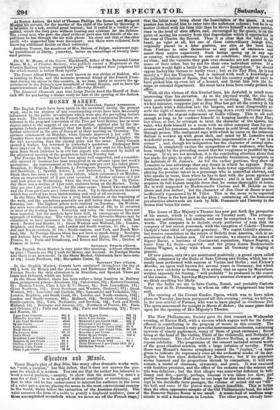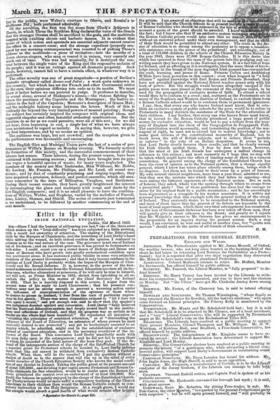The New Philharmonic Society gave its first concert on Wednesday
evening, at Exeter Hall, with a success which augurs well for its future efficacy in contributing to the progress of music in this country. The New Society has formed a very powerful instrumental orchestra, containing upwards of ninety performers, many of them of great eminence ; Sivori being at the head of the violins, Piatti of the violoncelli, and Bottesini of the contrabassi. The chef d'orchestre is Hector Berlioz, a name of Eu- ropean celebrity. The programme of the concert included several works of the great classical masters, with a large infusion of novelty. First, there was Mozart's famous symphony named the " Jupiter,"—a name given to indicate its supremacy over all the orchestral works of its day. Jupiter has been since dethroned by Beethoven; but if its grandeur seems lessened and its proportions shrunk by comparison, it will ever remain a model of clearness, symmetry, and grace. It was executed with faultless precision, and the effect of the andante and the minuet and trio was delicious ; but the first allegro was somewhat deficient in bril- liancy and fire,—partly, perhaps, because it was taken too slow, and partly because Exeter Hall may be too large for this kind of music. Ex- cept in the decidedly forte passage; the volume of sound did not "fill" the hall, and some of the pianos were almost inaudible. This is better than the often oppressive strepito of the Old Philharmonic band, for which the Hanover Square Room is too small. A music-hall of medium mag- nitude is still a desideratum in London. The other pieces, already fami- liar to the public, were Weber's overture to Oberon, and Rossini's to Gualaume Tell ; both performed admirably. Of the novelties, the first was the scene from Gluck's Iphigenia in Touris, in which Thoas the Scythian King declares the voice of the Oracle that the stranger Orestes shall be sacrificed to the gods, and the multitude respond with exulting shouts and barbaric dances. It is evident that music of which action and spectacle are essential adjuncts cannot receive due effect in a concert-room; and the strange expedient (properly cen- sured by our morning contemporaries) was resorted to of putting Thoas's address to the multitude—a piece of recitative—into the mouths of a dozen chorus-singers, who sang or roared it in unison, very coarsely and much out of tune. This was bad musically, for it destroyed the con- trast between the single voice of the King and the responsive acclaim of the people; and it was an outrage against all dramatic propriety. Such music, however, cannot fail to have a certain effect, in whatever way it is performed. The other novelty was one of great magnitude—a portion of Berlioz's dramatic symphony called Romeo and Juliet ; a work quite unknown in this country, but which has set the French and other Continental critics by the ears, their opinions differing tote coslo as to its merits. We must know it better before we can pretend to judge. It professes to describe, by sound alone, several of Shakspere's scenes,—the riotous fighting be- tween the partisans of the Capulets and the Montagnes ; the festive re- velries in the hall of the Capulets; Mercutio's description of Queen Mab ; and the midnight balcony scene between the lovers. Much of this is evidently far beyond the very limited powers of musical painting ; though the subject has certainly inspired the composer with original ideas, and suggested singular and often beautiful orthestral combinations. But the beauties, in so far as we could perceive, were all of this sort ; for we did not hear, from beginning to end, a single bar of what we have always been accustomed to regard as melody. In saying this, however, we give our first impressions, and by no means an opinion.
The, audience was large, but not crowded ; and the reception given to the performances was favourable and encouraging.



























 Previous page
Previous page